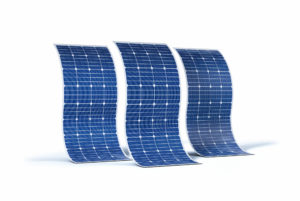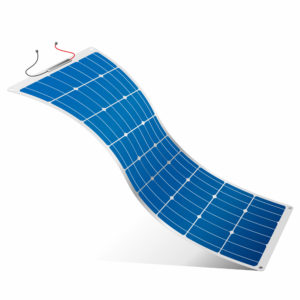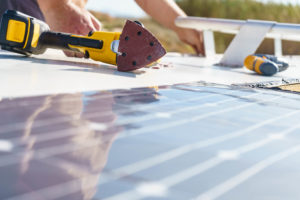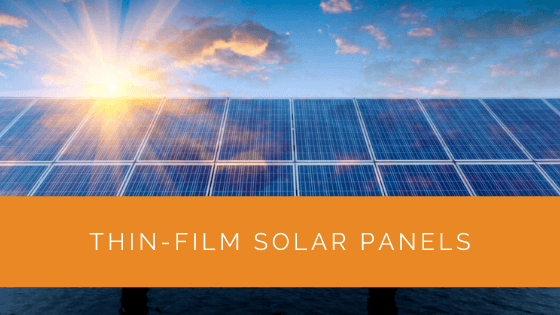Solar panels are becoming increasingly common in households these days. Almost every house, office establishment, or public building is equipped with solar panels, especially in the better-developed countries.
There are mainly two kinds of solar panels in use these days- silicon panels and thin-film solar panels. Among these, silicon-based solar panels are a lot more commonly used. This doesn’t mean that thin-film panels are any less. Thin-film solar panels have their benefits too.
The kind of solar panel you choose for your establishment mostly depends upon your needs and requirements. The more you read about them, the better you will get at picking the right type.
Picking the correct type of solar panel will help you save money and generate more energy from the sun’s rays. Here is a comprehensive guide to help you understand the concept behind thin-film solar panels and their benefits.
Keep reading and find out more!
Contents
- 1 Key Takeaways
- 2 What Are Thin-Film Solar Panels?
- 3 Top Features of Thin-Film Solar Panels
- 4 Principles and Working Mechanism of Thin-Film Solar Panels
- 5 Differences Between Thin-Film Solar Panels and Silicon-Based Panels
- 6 Case Study: Implementing Thin-Film Solar Panels at Solar Panels Network
- 7 Expert Insights From Our Solar Panel Installers About Thin-Film Solar Panels
- 8 Discover the Power of Solar with Solar Panels Network
- 9 In Conclusion
Key Takeaways
- Thin-film solar panels are smaller and more flexible than silicon-based panels, making them suitable for rooftops and small spaces, and they offer eco-friendly benefits with lower emissions.
- These panels are lightweight, easy to install, and require less maintenance than traditional silicon panels.
- While silicon panels have higher efficiency and credibility due to their longer presence in the market, thin-film panels are cost-effective and use lightweight materials, offering an alternative for certain applications.
What Are Thin-Film Solar Panels?
Thin-film solar panels comprise a series of solar cells placed adjacent. These cells combine to form a panel system that converts solar energy into usable electricity.
What sets these panels apart is their size and manufacturing materials. Lately, thin-film solar panels have gained popularity in households and commercial establishments. This is because of their compact size, making them perfect for rooftops and small lawns/backyards.
These solar panels are significantly smaller than their silicon-based counterparts and are easier to install in high-rise buildings. Their energy conversion rate is also a redeeming factor that makes them an excellent choice.
Top Features of Thin-Film Solar Panels
Several features make thin-film solar panels unique. Based on the following, you can decide if this type of solar panel system suits you.
1. They Are Flexible
Thin-film solar panels are about 300 times thinner than traditional silicon-based solar panels. This makes them exceptionally flexible and malleable. You can set them up anywhere to create a panel system that best fits your spatial requirements.
2. They Are Lightweight
Owing to their small size, thin-film solar panels are also very lightweight. They can weigh as little as 7 ounces per sq. ft., making them easily transported.
3. They Are Made of Safer Materials
Unlike most silicon-based panels, thin-film solar panel systems are made of Cadmium Telluride, Amorphous Silicon, and Gallium Arsenide.

4. They Are Eco-Friendly
While silicon-based solar panels are considered one of the greenest and cleanest ways to generate electricity, they still generate some harmful emissions. These emissions are common to products that use silicon as their main component.
Thin-film solar panels ace this field. They are mainly made up of GaAs or Gallium Arsenide, which has comparatively lesser emissions while functioning at a higher efficiency of up to 28%.
5. They Are Easy to Install
Because they are lightweight and flexible, thin-film solar panels are effortless to install. These panels can be scaled very quickly and installed on rooftops very easily.
Thin-film solar panels are also easy to manipulate, significantly enhancing installation processes.
6. They Are Easy to Maintain
Thin-film solar panels are easy to repair and require less maintenance than traditional silicon-based solar panels. This further helps reduce costs and makes installing smaller-scale solar panel systems easier. Such systems are generally installed on rooftops of homes and offices.
Principles and Working Mechanism of Thin-Film Solar Panels
So, do thin-film solar panels work any differently than silicon-based solar panels?
The answer is both yes and no.
Thin-film solar panels are based on the photovoltaic principle and absorb solar energy, which is then converted to usable electricity. This conversion occurs in the photovoltaic (PV) cells that make up the surface of the solar panels.
These cells are essentially semiconductors and work on the principle of the movement of electrons. They are composed of p-type and n-type materials. The combination of the two materials in every cell is responsible for the movement of the electrons.
The p-type material is electron deficient, and the n-type material has enough free electrons. When direct sunlight hits the surface of the solar panels, there is movement in the free electrons present.
The sunlight charges these electrons, and a p-n exchange takes place. This exchange and sudden movement in the electrons generate electricity. The current generated depends on the amount of activity experienced in the cell.
Traditional silicon solar panels use silicon as the primary material in the semiconductor. However, when it comes to thin-film solar panels, the materials used for semiconductors can be Cadmium Telluride (CdTe), Gallium Arsenide (GaAs), etc.

Differences Between Thin-Film Solar Panels and Silicon-Based Panels
As discussed above, thin-film solar panels differ greatly from the more commonly seen silicon solar panels.
What do you think sets them apart? Are they better than their silicone counterparts? Well, both types of panels have their own set of pros and cons.
Which one should you go for, then? Look at the differences to determine your property’s right solar panel system.
Credibility
Silicon solar panels have been around for decades. These panels are trusted in homes and widely used in commercial settings.
Contrarily, thin-film solar panels are not as popular. These models have just recently been introduced on a commercial scale. People are trying to get used to them and assess their performance.
Efficiency Rate
One of the most significant advantages of silicon solar panels is their high-efficiency rate. These solar panels have an efficiency rate of 12-24.4%, meaning they convert more solar energy into electrical energy and are very reliable.
On the other hand, thin-film solar panels are not as efficient. Although their absorption coefficient is higher than that of a silicon solar panel, the efficiency factor is not very high.
Cost of Installation
Over the last few years, the cost of silicon panel production and installation has decreased significantly. This makes them more accessible and cost-effective.
Thin-film solar panels are less expensive than silicon panels. They are easier to install and can be used for various applications. Their cost of installation is also significantly lesser than silicon solar panels.

Material Used
The most important distinguishing feature between the two types of solar panels is the material used in the semiconductor. Silicon panels use silicon-based materials, which makes them rigid and heavy.
On the other hand, thin-film solar panels are made of materials like Cadmium Telluride, Amorphous Silicon, and Gallium Arsenide. These materials enable thin-film solar panels to be flexible and lightweight. Installation is more manageable with such panels as one can easily manipulate them without too much effort.
Cost of Maintenance
Silicon solar panels are heavier and require much maintenance, especially in severe climatic conditions. You need to invest in their upkeep from time to time to prevent and slow down degradation rates.
On the contrary, thin-film solar panels are easier to run and cheaper to maintain.
Case Study: Implementing Thin-Film Solar Panels at Solar Panels Network
Background
At Solar Panels Network, we aim to provide diverse and adaptable solar solutions to meet various energy needs. In one of our recent projects, we focused on implementing thin-film solar panels for a client looking for a lightweight and flexible solar solution for their urban property. The project aimed to demonstrate the practical application and benefits of thin-film technology in a challenging urban environment.
Project Overview
The client required a solar solution that would not only reduce their energy bills but also adapt to the limited and uneven roof space available on their commercial property. The primary goal was to utilise thin-film solar panels to maximise the available space without compromising structural integrity.
Implementation
- Site Assessment and Customisation: Our team conducted a thorough assessment of the roof’s structure and space constraints. The flexibility of thin-film panels allowed us to design a custom layout that fit the roof’s unique dimensions and avoided shaded areas.
- Installation Process: The lightweight nature of the thin-film panels simplified the installation process. We installed the panels on the roof’s surface without additional structural support, significantly reducing installation time and costs.
- System Integration: The panels were integrated with an efficient inverter system to convert the DC output into usable AC power. We also installed a monitoring system to track energy production and performance in real-time.
- Testing and Optimisation: After installation, we conducted a series of tests to ensure optimal performance. The system was fine-tuned to maximise energy output, even under less-than-ideal sunlight conditions.
Results
- Energy Production: The thin-film panels achieved a satisfactory energy output, meeting the client’s expectations. Despite their lower efficiency compared to traditional panels, the system provided a consistent and reliable power supply.
- Cost Savings: The client experienced noticeable reductions in their electricity bills, highlighting the cost-effectiveness of thin-film technology. The lower initial investment and reduced installation costs contributed to overall savings.
- Environmental Impact: The project reinforced the client’s commitment to sustainability. The use of thin-film technology, which has a lower environmental impact during manufacturing, aligned with their green energy goals.
Summary
The implementation of thin-film solar panels at Solar Panels Network demonstrated the versatility and practicality of this technology in an urban setting. The project showcased the benefits of lightweight, flexible panels, including ease of installation, adaptability to challenging spaces, and cost-effectiveness. This case study underscores the potential of thin-film solar panels as a viable alternative for specific applications, particularly where traditional silicon panels may not be suitable.
Expert Insights From Our Solar Panel Installers About Thin-Film Solar Panels
Thin-film solar panels offer a unique blend of flexibility and lightweight design, making them ideal for installations where traditional panels might be too heavy or bulky. They’re an excellent choice for rooftops with limited space.
Senior Solar Engineer
One of the significant advantages of thin-film technology is its ability to perform in less-than-ideal conditions, such as partial shading or high temperatures. This can be a game-changer for installations in urban environments where space and sunlight can be limited.
Renewable Energy Specialist
While thin-film panels may not match the efficiency rates of traditional silicon panels, their cost-effectiveness and ease of installation make them a viable option for many projects, particularly where weight and aesthetics are a concern.
Lead Solar Technician
Discover the Power of Solar with Solar Panels Network
Are you navigating the world of solar installations? Look no further than Solar Panels Network, the UK’s trusted partner in harnessing the sun’s potential. Our dedication goes beyond just installations; we’re on a mission to transform how homeowners and businesses across the UK perceive and utilise energy. By choosing us, you’re reducing your carbon footprint and making a smart financial move that promises savings for years ahead. Contact us today and embark on your solar journey.
In Conclusion
Thin-film solar panels have a wide range of applications and can be used commercially. They are worth a shot if you have a smaller rooftop and wish to try something different.
However, it is essential to consult a professional before finalizing the type of solar panel that will work best in your establishment.
About the Author
Solar Panels Network stands at the forefront of solar energy solutions, driven by a team of seasoned solar engineers and energy consultants. With over decades of experience in delivering high-quality solar installations and maintenance, we are committed to promoting sustainable energy through customer-centric, tailored solutions. Our articles reflect this commitment, crafted collaboratively by experts to provide accurate, up-to-date insights into solar technology, ensuring our readers are well-informed and empowered in their solar energy decisions.

